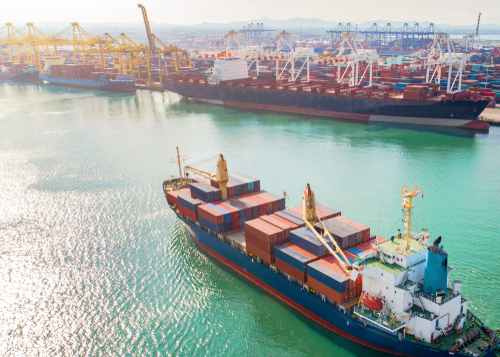
Five senators joined forces on Tuesday to introduce legislation that would address environmental issues in port communities and help ports be more climate-friendly.
U.S. Sens. Jeff Merkley (D-OR), along with Ron Wyden (D-OR), Cory Booker (D-NJ), Elizabeth Warren (D-MA), Martin Heinrich (D-NM), and Dianne Feinstein (D-CA), introduced the Climate Smart Ports Act of 2020, that would create a $1 billion per year federal program to improve port sustainability measures.
The legislation was also introduced into the House of Representatives by Rep. Nanette Diaz Barragán (D-CA).
The legislation would help ports replace cargo handling equipment, port harbor craft, cargo delivery trucks, and other equipment with zero emissions equipment and technology. Additionally, the bill would help ports develop clean energy microgrids to power their facilities and equipment, and authorize an additional $50 million per year to be spent specifically on reducing port emissions.
“This commonsense legislation is a win-win-win—helping marginalized communities breathe cleaner air, protecting our planet for generations to come, and creating reliable, high-paying jobs for our workers,” Merkley, a member of the Senate Environmental Justice Caucus, said. “I’m pleased to be teaming up with Congresswoman Barragán in urging our colleagues to stand up for environmental justice, climate action, and job creation by making our ports stronger and more sustainable.”
The bill would also work to create new, good-paying jobs by requiring ports and their customers to pay prevailing wage for any job paid for work performed with federal funds while protecting dock workers from being replaced by automation.
In addition, the bill would work on quality of life issues by addressing the environmental issues that arise in neighborhoods around ports. Nearly 40 percent of Americans live within three miles of a port, many of which are in low-income communities and communities of color. The residents of those neighborhoods are subject to increased levels of diesel fumes from trucks, ships, trains, and cargo handling equipment. A portion of the money in the bill would be set aside for funding in areas not in compliance with the Clean Air Act.
“Ports are job creators, but also major sources of air pollution with serious public health consequences, particularly for the communities of color that tend to live nearby. The people in these neighborhoods live close to working diesel trucks, ships, trains, and cargo-handling equipment spewing poisons into our air and water. And we’ve paid the price. By greening our ports, we can tackle this environmental injustice,” Barragán said. “We are often given a false choice between a clean, healthy environment and a strong economy. With the Climate Smart Ports Act, we don’t have to choose.”
The bill was backed by a wide array of organizations, from the International Longshore and Warehouse Union to the Sierra Club, and from the Environmental Defense Fund to Jobs to Move America.